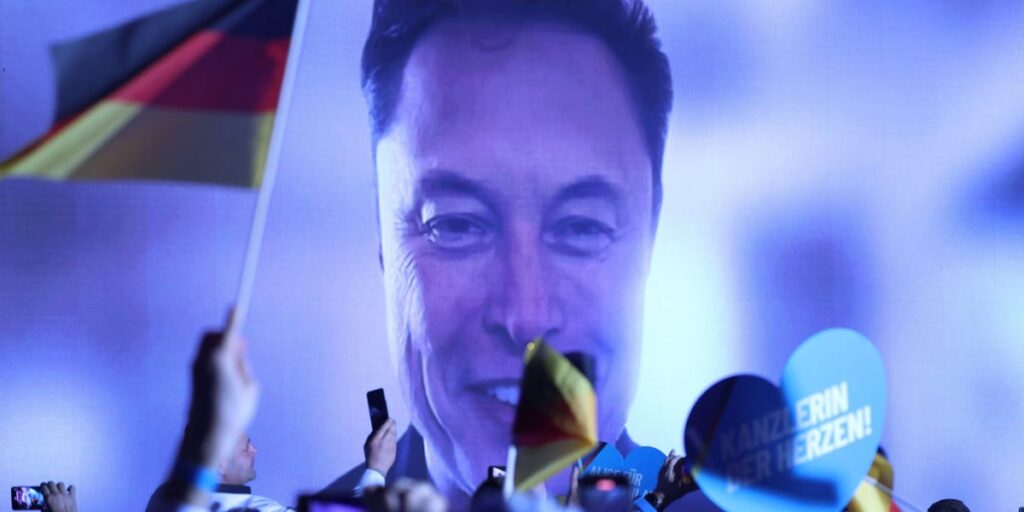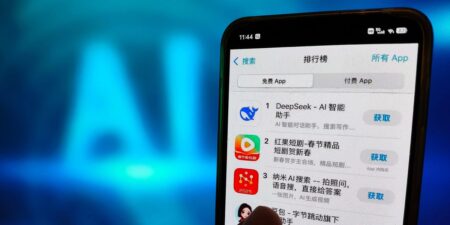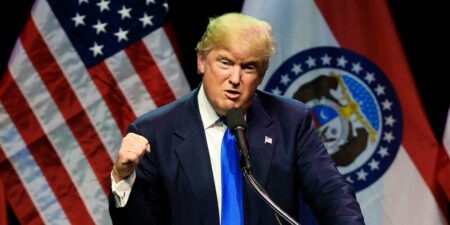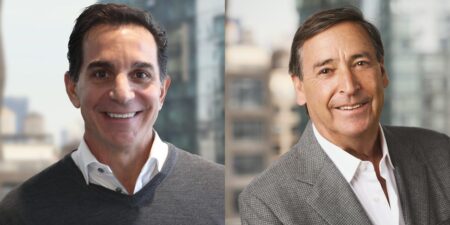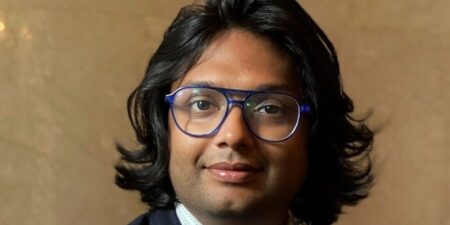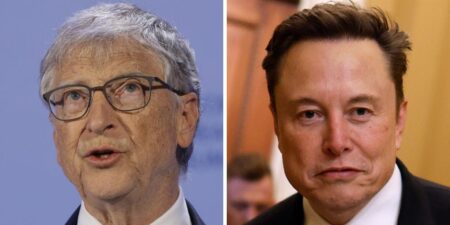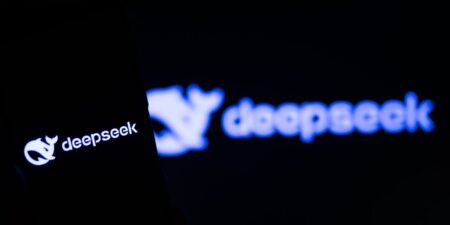- Elon Musk is promoting far-right movements in Europe, boosting political parties like Germany’s AfD.
- Founded in 2013, the AfD is known for its anti-immigration and anti-EU stances.
- Musk’s support for AfD has helped the party gain global prominence.
Elon Musk is flexing his political power, both at home and abroad.
On Saturday, Musk spoke virtually at a campaign event for the Alternative for Germany party, or AfD, a far-right political group that is — among other things — fiercely anti-immigration.
In his live-streamed speech alongside AfD leader Alice Weidel, Musk told about 4,500 AfD supporters they should celebrate German culture.
“It’s good to be proud of German culture, German values, and not to lose that in some sort of multiculturalism that dilutes everything,” he said.
Musk’s support for AfD — which has come primarily in the form of posts on his social media platform, X, but also in newspaper op-eds and speeches — has helped what was once a fringe political party enter the mainstream, lifting it up in front of a global audience.
What is Germany’s AfD?
Founded in 2013, the AfD is “quite extreme even by European far-right standards,” Kai Arzheimer, a political science professor at Germany’s University of Mainz, told Business Insider.
“It’s a party that’s been isolated in the European Parliament,” he said. “Even other far-right parties don’t want to cooperate with the AfD.”
It wasn’t always that way. Arzheimer said AfD was once “very much an upper-class party,” popular among those in center-right politics. Within a few years, however, it had tacked to the right over issues like immigration and the role of Islam in Europe.
“We had this huge influx of refugees from the Middle East, mostly from Syria, and that accelerated this development of the party,” Arzheimer said. “So from around about 2017, they were a national force in politics.”
The Russian invasion of Ukraine, which stoked fears about energy security, helped the party increase its support, Arzheimer said.
“What sets them apart from many other radical right parties in Europe is that they are quite open about their relationship with right-wing extremist actors outside the party and even inside the party. So they are on a trajectory that has taken them to the very margins of the political spectrum. Nonetheless, they’re quite popular,” he said.
Those affiliations have caught the attention of Germany’s domestic intelligence agency, which has put the group under surveillance for extremism.
The AfD is also nationalist, promoting an anti-European Union agenda.
“[The AfD] is characterized by an anti-EU, anti-globalization, and anti-migration platform topped by an uncritical stance with regard to some of the dark chapters of German history,” Thomas Zittel, a politics professor at Goethe University Frankfurt, told Business Insider. “What is missing with this party is a constructive and promising economic agenda that would match the anti-regulatory stances that Musk probably wishes to see.”
What Musk has said about AfD
“I’m very excited for the AfD. I think you’re really the best hope for Germany,” Musk told the crowd on Saturday.
The Tesla CEO, who owns a major electric vehicle factory near Berlin, first publicly backed the AfD in a short post on X in December that quickly bounced around the world and upended German politics. Germany is holding national elections in late February.
Then, in a December op-ed for Welt am Sonntag, a major German newspaper, Musk called the AfD the “last spark of hope for this country.”
Welt am Sonntag and Business Insider are both owned by Axel Springer SE.
Musk has praised AfD’s stances on “controlled immigration” and limited government regulation and reposted comments on X accusing Europe and the United States of overusing the label “far-right.” He also called German Chancellor Olaf Scholz an “incompetent fool.”
He has waded into far-right politics in other nations, too. Musk called for UK Prime Minister Keir Starmer to be removed from office and for the release of Tommy Robinson, a jailed British far-right agitator whose real name is Stephen Yaxley-Lennon.
“He supports not just the AfD but also more obviously right-wing extremist actors. So for instance, Tommy Robinson in the UK, someone who’s incarcerated,” Arzheimer said. “Also, many other right-wing extremists became more and more noisy on Twitter, X, whatever you want to call it, and that is seen as something very problematic when we talk about Elon Musk.”
Musk has posted on X the MAGA-adjacent phrase, “Make Europe Great Again,” one of many comments that have caught the attention of European leaders.
“I think you want more self-determination for Germany and for other countries in Europe and less from Brussels,” Musk said in his speech on Saturday, referencing the European Union headquarters. “There’s too much bureaucracy from Brussels, too much control from a sort of global elite.”
Representatives for Musk did not immediately respond to a request for comment.
The impact of Musk’s pro-AfD stance
As Musk’s power and influence grows, so does his impact on democracy, Arzheimer said.
“He has this control over social media. He has a lot of money. He has a huge factory in Germany,” Arzheimer said. “He has got many other commercial interests, so he’s increasingly seen as a political danger to liberal democracy.”
Though Musk cited his economic interests in Germany in his op-ed, Arzheimer said it’s also possible that this is just his worldview.
“Maybe it’s all instrumental. Maybe it’s all a game to him. Maybe he’s on a personal journey. I have no idea. But it’s quite systematic,” he said.
AfD has gained traction in Germany, and polls now indicate it could receive as much as 20% of the vote on February 23. The party, however, remains isolated. Mainstream German parties have so far refused to join it in any coalition.
Musk’s endorsement may interest young people and business leaders, but it also could further isolate the party.
Musk, for example, caused a stir in Germany after his speech at Trump’s inaugural celebration last week, Arzheimer said. While speaking to a crowd, Musk made what some interpreted as a fascist salute.
Musk denied a few days later that his gesture was anything but innocent, posting on X: “It was astonishing how insanely hard legacy media tried to cancel me for saying ‘my heart goes out to you’ and moving my hand from my heart to the audience.”
In Germany, Arzheimer said a gesture like that could land someone in serious trouble, regardless of their intention.
“Of course, that gesture is actually illegal in Germany,” he said. “It’s not going to happen, but in theory, he could be persecuted for that because it’s seen as a symbol of the Nazi rule, and those symbols are outlawed in Germany.”
“He’s pushing these ideas. He’s bringing back all those extremists to Twitter,” Arzheimer added. “I think many people were not surprised in Germany or, in the European context, of him acting like that at the inauguration party.”
Read the full article here







